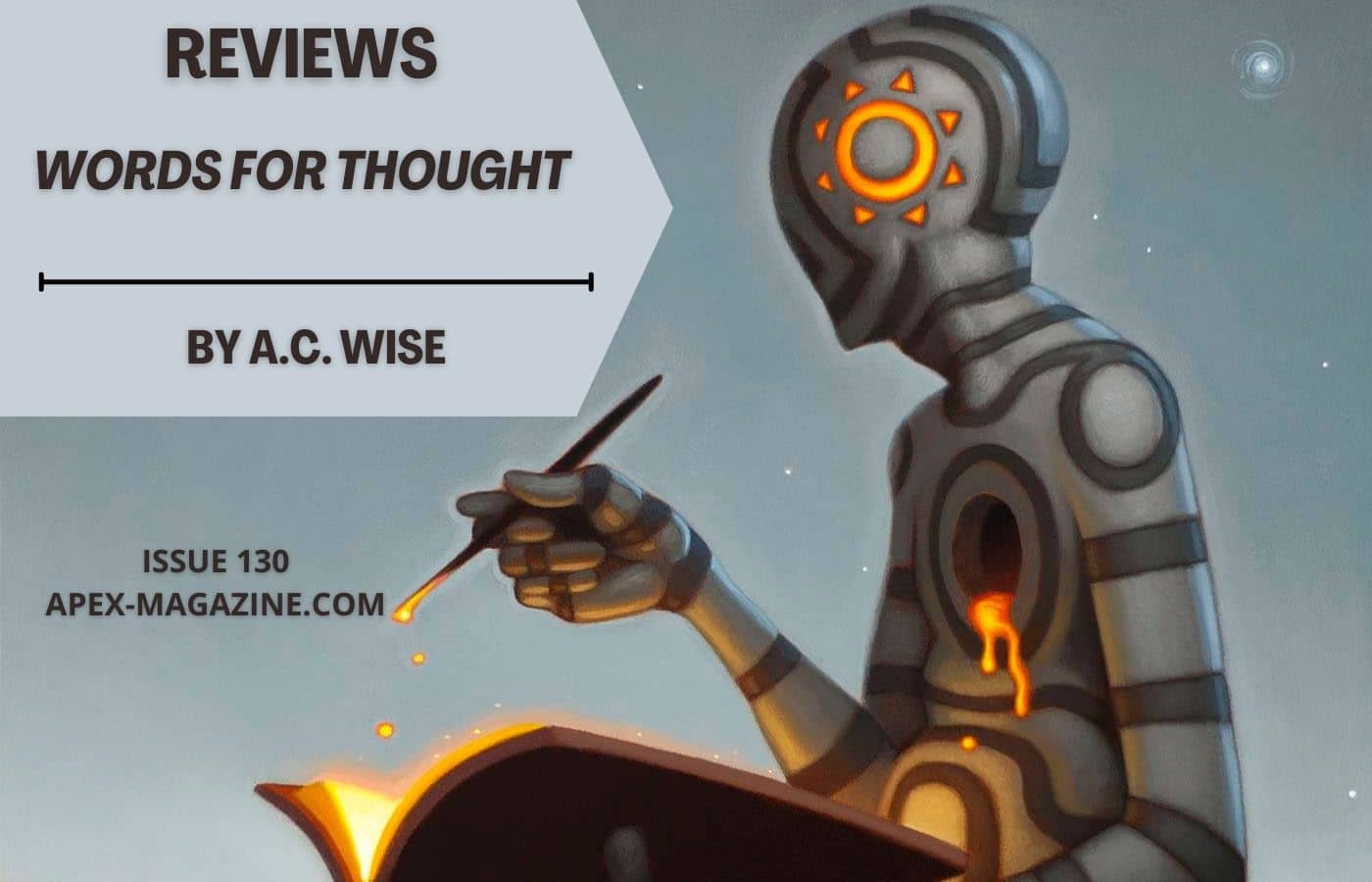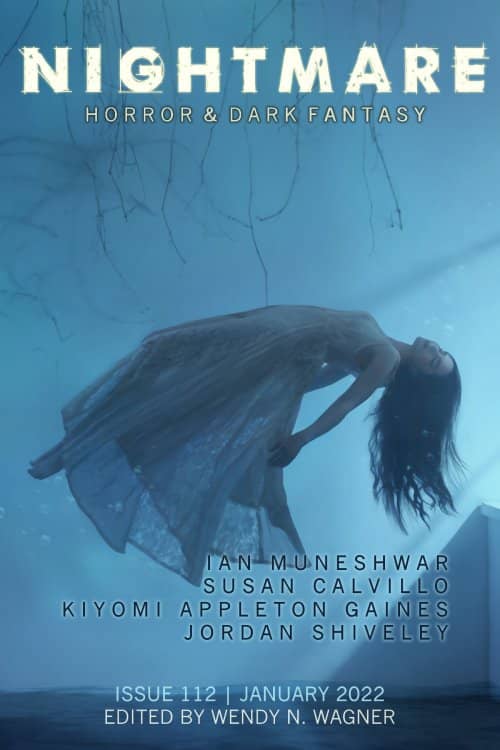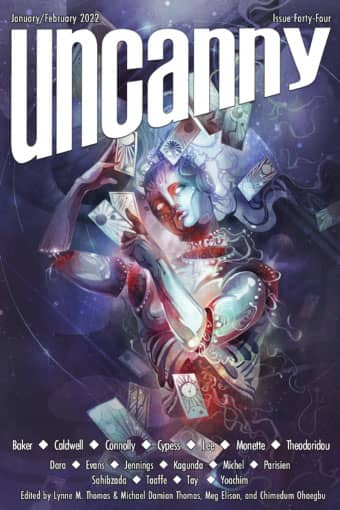
Welcome to another Words for Thought! I’m writing this in the depths of a snowstorm, though one that’s turned out to be much less dramatic than predicted. By the time this column publishes however, we’ll be that much closer to spring. So, out of the heart of winter, I offer you a mix of truly chilling horror balanced with stories of love and hope. It feels appropriate for this liminal space where I’m writing from one season and anticipating another. Happy reading!
§
A Gentleman’s Agreement by Aimee Ogden in the Winter 2022 issue of Kaleidotrope is exactly the kind of story for which I’m a total sucker. Beautifully-written, check. A complex relationship between superhero and supervillain, check. Queer longing, check. It also happens to be one of the first pieces of short fiction I read in January, and it was a truly lovely way to start off the reading year.
Sphinx may not be the Cavalier’s arch nemesis, that honor likely goes to Doc Diablo, but he is certainly the nemesis that knows the superhero the best. When he finds the Cavalier wounded after an explosion caused by Doc Diablo, rather than taking advantage of the situation, Sphinx brings the Cavalier home with him, tends to his wounds, and gives him a chance to heal. Attacking an enemy while he’s down wouldn’t be gentlemanly. There are unspoken rules. Winning isn’t the point; the game itself is what matters.
No need to check for a pulse, then. “Of course I wouldn’t,” Sphinx says, “and I won’t.” That would fly in the face of the rules by which they have always played. Death is a door that cannot be reopened, a riddle with no answer. How dull; how wasteful. Sphinx and the Cavalier are gentlemen; Doc Diablo is a mad dog that chases mutually assured destruction in his dreams. “Now be still.”
There’s a long history in superhero fiction of villains and heroes defining each other. What would Batman be without the Joker, what would Joker be without Batman? They give each other purpose, someone to test themselves against. If supervillains didn’t exist, what need would there be for superheroes and vice versa. It’s a fun dynamic, and Ogden captures it perfectly in this story—the idea of two characters who live by their own particular codes, with lines they won’t cross, perhaps wishing things might be otherwise, but understanding that they are limited by their chosen roles and playing within those boundaries. It’s a gentle kind of heroism and villainy, a relationship built on mutual respect. Even though they are on opposite sides of the line, at the end of the day, Sphinx and the Cavalier understand each other in a way no one else can. It’s sweet and it’s sad and it’s a wonderful read—like I said, the perfect way to kick off the new year.
§
On the other end of the spectrum, Intrusions by Margot McGovern in the January issue of The Dark is anything but comforting. The main character has taken to sleeping in other people’s unoccupied houses; it’s the only place she feels safe. Her ex-boyfriend is stalking her, and so she finds houses that are on the market, where the owners have already moved out so she can stay the night in a place no one knows to look for her.
I never stay more than a night or two and I’m careful to leave no trace. Like a ghost no one ever sees. I’ve been doing it for months now. Hiding in the blind spots of other people’s lives.
The imagery of ghosts repeats throughout the story—the main character is a ghost, her ex-boyfriend haunts her life. McGovern does an excellent job of blending the idea of real-world horror with the supernatural, sliding effortlessly from the terror of hiding from a human stalker to the main character finding herself in a house that is haunted in a much more literal way.
The story is a slow burn, with tension building sharply at the end, perfectly capturing the creeping feeling of not being alone and then the terror of having that feeling confirmed. McGovern uses the supernatural to great effect, having it underline and reinforce the real-life horror of a woman who has her safety and boundaries stripped away, leaving her feeling like there’s nowhere to go and that she’s better off taking her chances with actual ghosts.
Dick Pig by Ian Muneshwar published in Nightmare Magazine is equally unsettling and presents a similar scenario while taking the story in a very different direction. The protagonist is getting his late Aunt Norma’s house ready to sell. It’s appropriately isolated, cold, rundown, and he can’t help thinking of the way his aunt died and wasn’t discovered for several days. To take his mind off things, he surfs Grindr, leading to a series of increasingly odd and disturbing messages. Messages that continue to follow him even when he deletes the app, implying that he’s being watched, that the messages are coming from inside the house even though he’s supposedly there alone.
What a fucking creep. I swipe back to hungdaddy’s profile and am reaching my thumb toward the almighty block button when I notice that the profile has changed. The name and picture are the same, but his distance no longer reads fifteen miles. It’s now one mile.
Like McGovern, Muneshwar perfectly captures the eerie feeling of not being alone, of feeling like nothing is safe and there’s nowhere you can go. Where McGovern uses the supernatural to underline real-world horror, Muneshwar explores the opposite side of the coin, using real-world terror as a stepping stone to the supernatural as things get increasingly weird and the dimensions of the house change, leaving reality behind. Both stories do an excellent job of building tension and they make for excellent paired reading—one leaning harder into the weird and the other skirting the edges of it. Muneshwar evokes fairy tale elements as well, calling to mind the story of the three little pigs trapped inside while the wolf stalks them from the outside. It’s effectively done, exploring the line between desire and fear and the heightened state of awareness brought about by both.
Bringing things back from the horrific to the hopeful is The Brave Dress by Starhawk from the debut issue of Solarpunk Magazine, which launched in January. The story is set in a world where the binary understanding of gender is no longer dominant, and people are far more conscious of living sustainably, respecting nature, and respecting each other. It’s a much different world than the one Bou grew up in. When sh’he attended hir prom in a frothy pink satin dress, sh’he was mocked and attacked for being hirself, and sh’he has carried that scar with hir all hir life. Despite the trauma associated with the dress, it’s also a source of pride for Bou, it’s a moment sh’he chose to be brave, and sh’he wants to share that with her child, Lemma.
For almost forty years, it had lain, encased in an old-style zippered plastic bag, packed with chips of cedar, a lace-edged sachet of lavender, and a few moth balls that gave out a pungent odor as Bou drew it out. Or rather, as it erupted out of its bag in a froth of pink as if it had lain in wait for all those decades for just this moment.
Sh’he tries to gift the dress to Lemma for hir Rideup ceremony, but Lemma wants nothing to do with the dress. To hir mind, it’s tacky and old-fashioned and doesn’t speak to hir style. Bou takes this as an insult, yet another rejection of hirself tied to the dress, while hir partner, Riley, steps in to try to smooth things over.
The story does an excellent job of exploring complicated family relationships, especially when it comes to parents and children. How do you honor the past while still being yourself and not hurting someone else’s feelings? How, as a parent, do you communicate important history to your child without trying to live their life for them? It’s a lovely story, at once heartbreaking and uplifting, about respecting what came before, but also moving forward, and understanding that one generation’s struggles won’t necessarily be the struggles of the next generation, but that doesn’t mean they don’t matter.
Ribbons by Natalia Theodoridou in the January/February issue of Uncanny is another story that links fashion to its characters’ understanding of their gender, while evoking various fairy tales and legends. The title references the classic story “The Green Ribbon”, which has had multiple titles and versions over the years, but generally involves a woman with a mysterious green ribbon tied around her neck that she won’t let anyone touch, until her insistent boyfriend or husband finally convinces her to let him untie it and her head falls off.
In Theodoridou’s world, all children who are assumed to be female at birth are born with a ribbon. As a trans man, Jan has a complicated relationship to his ribbon. He’s afraid of how it defines him in other people’s eyes, but he’s also afraid to remove it, having grown up with the story that if he removes it, he will lose his head.
Monday’s lover tugs at Jan’s ribbon with his teeth. Jan doesn’t yell at the lover to stop. The guy just received bad news from the front—a friend lost to a bomb, perhaps, a sibling blown to bits; Jan doesn’t ask. He tells the lover, instead, to be careful: We don’t want my head rolling off now, do we? We’ve all heard of them, after all, the stories of women taking it off and their heads falling to the ground. Jan is a sex worker, and he talks to his various lovers about their understanding of themselves, the stories they grew up with, and the extent to which those stories inform how they see themselves. Every person he talks to has a different understanding of themselves and the way they are perceived in the world. Some are comfortable in their own skin—or feathers, as the case may be—and some have fraught relationships with who the various fairy tale stories that tell them who they’re meant to be. The story is beautifully written, set against a backdrop of war, and exploring the shadow of violence, myth, transformation, and having the courage to define oneself in defiance of dominant narratives and expectations. As with Starhawk’s story, there are moments of heartache, but ultimately it’s a story of hope and finding and honoring your own truth.













